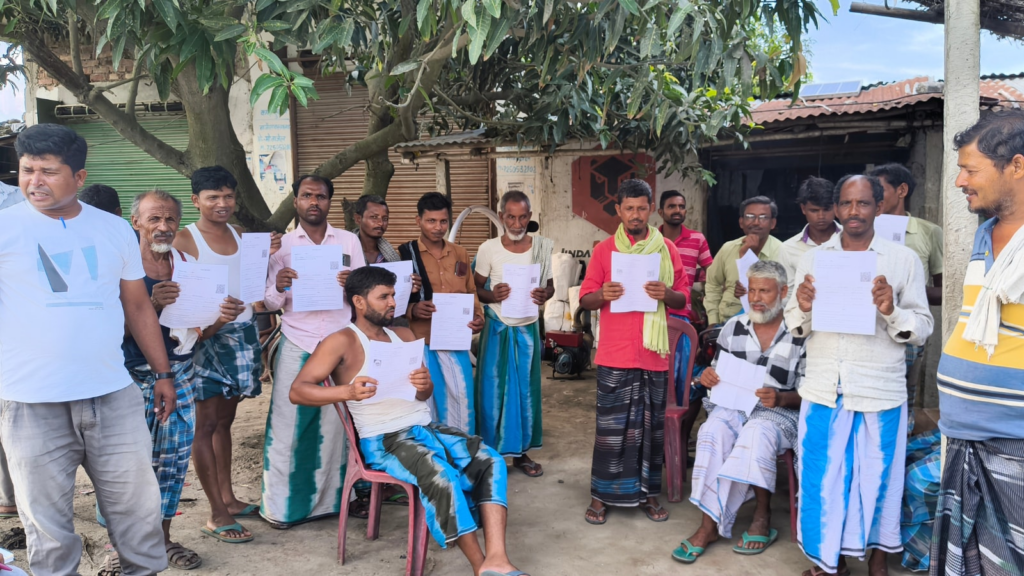New DelhiJul 25, 2025 21:49 IST
First published on: Jul 25, 2025 at 21:49 IST
As the first phase of the Special Intensive Revision (SIR) of Bihar’s electoral rolls concluded on Friday, the Election Commission (EC) said about 92% of 7.89 crore registered voters in the state would remain on the draft rolls to be published on August 1. About 8%, or approximately 65 lakh names, are likely to be removed from the draft rolls after they were found to be either deceased, registered in more than one place, permanently migrated to another place, or untraceable, according to the EC.
The poll panel said 7.23 crore electors had submitted their forms, approximately 22 lakh of the electors were found to have passed away, an estimated 7 lakh were registered in more than one location, and approximately 35 lakh had either permanently migrated or could not be traced. This accounts for 99.8% of the total electors. The forms of 1.2 lakh electors had not been received till Friday evening, the EC said.
“Forms of 7.23 crore electors have been received and digitised; the names of all these electors will be included in the draft electoral roll. The digitisation of forms, along with Booth Level Officers reports, of the remaining electors will also be completed by August 1, 2025,” the EC said in a statement. The list of those who had not submitted their forms or were found to have either died or migrated had been shared with 12 national and state parties, the poll body said.
While the names of 65 lakh electors are expected to be removed in the first phase, the final roll scheduled to be published on September 30 could see further deletions as electors’ documents have not yet been taken into account. Those whose names do not make it to the draft can also appeal in the claims-and-objections phase, which will run from August 1 to September 1, and make it to the final list.
Praising the efforts of officials and other stakeholders, the EC said, “The credit for the successful completion of the first phase of SIR so far, goes to the CEO (Chief Electoral Officer) of Bihar, 38 DEOs (District Election Officers), 243 EROs (Electoral Registration Officers), 2,976 AEROs (Assistant EROs), BLOs deployed at 77,895 polling booths, volunteers, all 12 political parties, their 38 District Presidents, and the 1.60 lakh BLAs (Booth Level Agents) nominated by them. As per the SIR order, from August 1 to September 1, any elector or political party may fill the prescribed forms and submit claims to the ERO for any eligible elector who is left out or file objections for removal of any ineligible elector.”
The EC on June 24 announced the voter-verification drive in Bihar, where Assembly elections are due to be held later this year. As per the EC’s schedule, all existing electors were required to submit their enumeration forms from June 25 to July 25. The EC had said only those electors whose forms were received by July 25 would be included in the draft roll. In addition to the forms, those added to the rolls after January 1, 2003, are required to submit documents from a list of 11 specified by the poll body, establishing their eligibility to be electors, that is, age and citizenship.
Though the “detailed guidelines” issued along with the June 24 order said the electors would have to submit the documents along with their forms, the poll panel clarified on July 6 that the electors could submit their documents in the claims-and-objections period.
A batch of petitions has been filed in the Supreme Court challenging the SIR exercise. Though the exercise places the burden of proving their eligibility to vote on the registered electors, the EC’s Form 6 for registering new electors does not ask for citizenship documents. New electors, before the EC’s June 24 order, were only required to sign a declaration that they are citizens and can face action if found not to be. Opposition parties have been protesting against the move, raising concern about the potential disenfranchisement of voters. On Wednesday, RJD leader Tejashwi Prasad Yadav said his party could “consider boycotting” the Assembly polls over the electoral roll revision, while the Congress said “all avenues are open”.
The Indian Express has published a series of reports on the sense of unease that the SIR exercise triggered in Bihar, from voters belonging to the Extremely Backward Classes and minority communities to the upper castes. This unease was palpable from Chief Minister Nitish Kumar’s turf in Nalanda and RJD chief Lalu Prasad’s Raghopur in Vaishali to Muslim-dominated Seemanchal.




